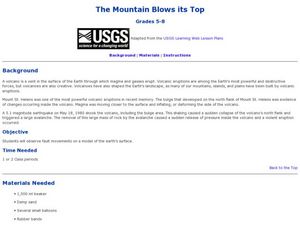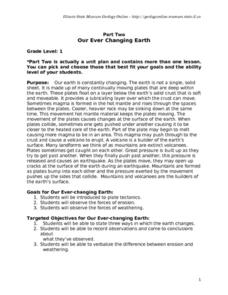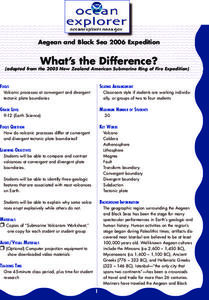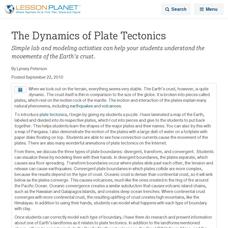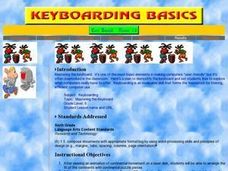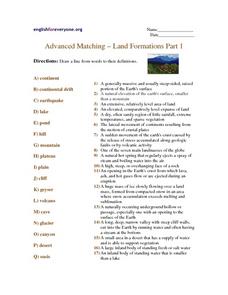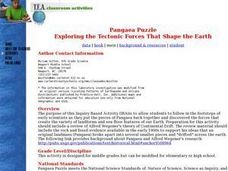Curated OER
Letter to the President
In this letter to the President worksheet, students write a letter to the President about earthquakes and volcanoes. Students include 4 bullet points in their letters.
Curated OER
The Mountain Blows its Top
Students replicate a volcanic eruption. In this volcanoes lesson, students follow the provided procedures to show and describe how the inflation of a bulge led to the eruption of Mount St. Helens.
Curated OER
Mount St. Helens Shakes and Burps
Students uncover the nature of volcanoes and locate some of the world's active, dormant, and extinct volcanoes. They also discover how scientists detect, measure, and predict volcanic activity.
Curated OER
Exploring Rocks
Students recognize differences in the size, shape, texture, and color of different rocks. In this rocks lesson plan, students also learn and repeat back how a volcano erupts and make one out of a toilet paper tube.
Curated OER
Mount St. Helens
In this volcano worksheet, middle schoolers will read about the events that led to the eruption of Mount St. Helens in 1980. Students will use this information to complete 3 short answer questions.
Curated OER
Our Ever Changing Earth
First graders study ways in which the earth changes due to erosion and weathering in this series of lessons.
Curated OER
The Ocean Floor
Practice reading comprehension by approaching oceanography through 2 pages of informational text. The text compares the ocean floor to the Grand Canyon to gives students perspective, and gives a brief coverage of the earth's crust and...
Curated OER
The Dynamic Earth
Students use the Internet to investigate earthquakes and plate tectonics. In this plate tectonics lesson, students complete a web quest with multiple links and activity types relating to earthquakes and volcanoes. They connect the...
Curated OER
Exploring Plate Tectonics
For this plate tectonics worksheet, learners complete 8 fill in the blank questions on plate boundaries, 9 short answer questions on the Earth's crust and 5 fill in the blank on continental drift. There are 3 follow questions at the end.
Curated OER
Volcanoes And Atmospheres
Students identify the volcano as the primary source of atmospheric gases, to explain the formation of ozone, and to recognize the dangers of volcanic gases through the use of technology in the classroom.
Curated OER
The Changing Earth
Students explore the Earth's crust. In this earth science lesson, students participate in 2 activities that demonstrate physical and chemical weathering. Students also play Jeopardy with topics including volcanoes, earthquakes,...
Curated OER
Hazards: Fifth Grade Lesson Plans and Activities
After comparing earthquake and volcanic hazards to one another, fifth graders take a closer look at damage associated with a volcanic eruption. They then create a simulation of mudslides due to a volcanic eruption. Using different...
Science Matters
Spaghetti Fault Model
Does increasing the pressure between two moving plates provide a stabilizing force or create more destruction? The hands-on instructional activity encourages exploration of strike-split fault models. The sixth instructional activity...
Curated OER
Cruising the Mantle
Students explore the plate boundaries of the earth. Through the use of video, internet and hands-on activities, students examine the types of plate boundaries. They create a model to illustrate the movement and interaction of the...
Curated OER
What's the Difference?
Students investigate volcanic processes at convergent and divergent
tectonic plate boundaries. They read and analyze diagrams, complete a worksheet, and write an essay.
Curated OER
Eruption
Young scholars conduct an experiment simulating an underwater volcano based on reading The Magic School Bus Blows Its Top. They create a desktop volcano eruption demonstrating where magma comes from and how lava flows.
Ocean Explorer
Living with the Heat
Young oceanographers study the Submarine Ring of Fire, which is a series of deep-water volcanic vents that come up from the ocean floor. Learners take a close look at the unique ecosystems that are associated with these areas, how these...
Curated OER
The Dynamics of Plate Tectonics
Simple lab and modeling activities can help your students understand the movements of the Earth's crust.
NOAA
Seamounts
How do chains of islands form? Young oceanographers explore the mountains of the deep in the final installment in a 13-part series. The interactive compares types of seamounts based on their overall height and height under the water, as...
Curated OER
Natural Disasters: An Adventure in Non-Fiction
Students study different natural disasters. In this natural disaster lesson students read a nonfiction book followed by a discussion, an experiment, then collect illustrations from their experience.
Curated OER
Mastering the Keyboard
Sixth graders view an animated program showing how the continents fit together millions of years ago. In groups, they compare and contrast the distribution of rocks and fossils based on how the continents fit together. After reading a...
Curated OER
Advanced Matching--Land Formations Part 1
Using this activity, learners could review information they have covered about land forms, such as hills, mountains and plateaus. This 17 question activity could be used with upper elementary or ESL students to test or review information...
Curated OER
Pangaea Puzzle: Exploring the Tectonic Forces That Shape the Earth
Sixth graders follow in the footsteps of early scientists as they put the pieces of Pangaea back together and discovered the forces that create the variety of landforms and sea-floor features of our Earth.
Curated OER
Life of an Island: From Mountain to Atoll
Young scholars research the evolution of a volcanic island from origin to erosion. They determine the relative ages of the Northwestern Hawaiian Islands given their position in the archipelago.



